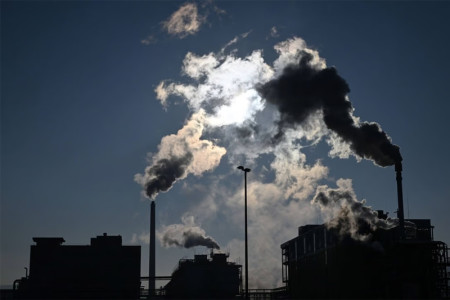The proportion of companies that have set decarbonisation targets has risen slightly over the past five months, but there has been hardly any improvement in their goals that align with global climate ambitions, according to index provider MSCI.
While some 44 per cent of publicly listed companies have set decarbonisation targets as of March, only 17 per cent of their objectives align with global climate ambitions, compared with 36 per cent and 16 per cent, respectively, in October, it said in a report on Monday, showing the need for quicker adoption of tougher targets and greater efforts to achieve them.
This is because listed companies are on track to deplete their "emissions budget" for limiting global warming to 1.5 degrees Celsius above pre-industrial levels by October 2026, two months earlier than its estimate last October, the report said.
Do you have questions about the biggest topics and trends from around the world? Get the answers with SCMP Knowledge, our new platform of curated content with explainers, FAQs, analyses and infographics brought to you by our award-winning team.
The projection is based on the emissions and reduction targets of the 9,144 constituents of the MSCI All Country World Investable Market Index covering 23 developed markets and 27 emerging market countries.
"We are seeing greater progress from public companies towards achieving essential climate goals, but the MSCI Net-Zero Tracker reveals that a significant gap remains between their climate commitments and their carbon emissions," said Sylvain Vanston, the executive director for climate investment research at MSCI.
"The equation for investors is that they must address transition risks today or face severe and irreversible physical risks tomorrow, and that they have a role to play in driving the existential change required."
Asia-Pacific firms' emissions could cause Earth to warm by 2.9 degrees: MSCI
Physical risks refer to potential losses from infrastructure damages and business disruption from extreme climate events, such as droughts and floods. Transition risks arise from changes in policy and new technologies, such as the growth of renewable energy, that would make carbon-intensive business models no longer viable.
Global greenhouse gas emissions must peak by 2025 and be slashed by 43 per cent by 2030 and reach net zero by 2050, if global warming is to be limited to 1.5 degrees, scientists estimated in a United Nations assessment report last year.
Facilities owned by the listed companies are on track to emit 11.2 billion tonnes of greenhouse gas emissions this year, unchanged from last year, according to the MSCI's projections. This puts companies on a path consistent with the warming of the planet by 2.7 degrees by 2100 from pre-industrial levels, with firms in North America and Asia-Pacific on a 2.8 degrees trajectory, compared with 2.2 degrees for those in Europe, Middle East and Africa.
Research published last month by Sustainalytics, a sustainability data provider, showed that only a quarter of 4,000 of the world's largest listed companies have "strong" emissions reduction targets. And only 8 per cent have "strong" greenhouse gas performance incentive plans, mostly utilities and real estate firms, it added.
Based on its assessment of how these companies currently manage their emissions reduction, the world is expected to warm by 2.9 degrees by 2100, Sustainalytics said.
The Earth has warmed by 1.1 degrees in the decade to 2020 compared to 1850-1900 levels, according to the UN's Intergovernmental Panel on Climate Change.
More than a quarter of China is expected to face medium to high risks from physical climate impacts under a 2 degrees warming scenario, with extreme heat and flooding being the top risks, according to a separate MSCI report published on Monday.
In a hypothetical China investment portfolio where energy and utilities firms had a combined 5 per cent weighting, they contributed a third of the potential losses caused by extreme heat.
Extreme heat could drive up air-conditioning and electricity consumption, reduce the efficiency of solar panels, reduce water availability for hydropower generation and reduce cooling capacity for fossil fuel power plants, said Siyao He, an analyst at MSCI Research.
Under a 5 degree warming scenario, the value-at-risk - a measurement of potential losses - for the MSCI China Climate Paris Aligned Index, comprising 193 firms with lower physical and transition risks, was 70 per cent less than that of the MSCI China All Share Index with 785 stocks.
"Companies with committed decarbonisation targets and properly defined risk management procedures tend to be less vulnerable to the physical risk in the long run," said Shuo Xu, a vice-president at MSCI Research.


